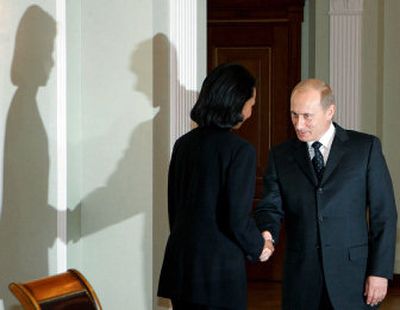Russia rebuffs Rice on Iran dispute

MOSCOW – Russia reiterated Saturday that it opposes referring Iran to the U.N. Security Council over its nuclear activities, dealing a setback to the Bush administration’s hopes for putting a tighter diplomatic squeeze on Tehran.
Secretary of State Condoleezza Rice met with Russian President Vladimir Putin and his aides in hopes of nudging Russia to take a harder line with Iran. Instead she found no movement on the part of Russia, whose position is critical because it’s helping Iran build a civilian nuclear power plant.
Russian Foreign Minister Sergei Lavrov said Moscow believes, for now, that Iran’s violations of nonproliferation rules should be dealt with by the International Atomic Energy Agency, not the United Nations, which could impose economic sanctions or other measures.
“The current situation permits us to develop this issue and do everything possible within the means of this organization without referring this issue to other organizations,” he said after talks with Rice.
Russia abstained last month when the IAEA voted to censure Iran for its lack of cooperation. The agency’s governing board delayed further action in the hope that negotiations on the dispute will resume.
Rice, speaking to reporters aboard her flight from the Russian capital to London, said she did not see the talks’ outcome as a setback for the Bush administration strategy.
On the contrary, she said, both Russia and the United States agree on using the next six weeks – before the IAEA’s governing board meets Nov. 24 – to cajole Iran back to nuclear talks with the European Union.
“We will know, by that time, whether or not the Iranians are prepared to enter into negotiations that might lead to an acceptable outcome,” Rice said.
But Rice’s talks in Moscow underscore that the United States has much work to do to convince other nations to abandon negotiations and confront Iran more directly.
After last month’s IAEA vote, top U.S. officials predicted that Iran would be referred to the Security Council at the November meeting. Rice declined to set any firm deadline Saturday.
The possibility that Iran’s harshly anti-American theocratic regime could get a nuclear weapon is one of President Bush’s most pressing foreign policy challenges.
Iran denies that it is seeking a nuclear weapon and insists that it has the right to enrich uranium for civilian nuclear power. But it hid suspicious nuclear activities for years, acknowledging them only after being confronted with the evidence.